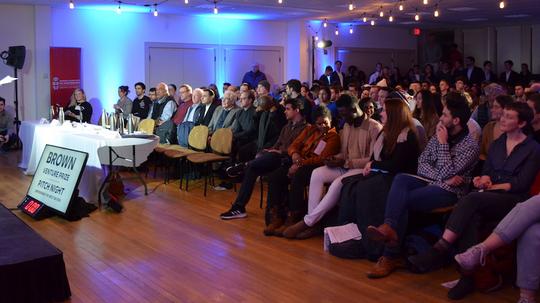
The Brown University venture prize competition hosted by the Nelson Center for Entrepreneurship was another huge success this year, showcasing the finest student startups not only at Brown, but within the higher education ecosystem in the Ocean State.
The pitch night is designed to empower the most advanced entrepreneurial ventures by students and supports teams who have identified a significant opportunity and whose ventures have the potential to create “impact at scale.” In our last post, we detailed the three big winners who took home the total $50,000 in prize funding. But let’s not forget about the five other finalists. While they may have not won money, the future is bright for these companies and we expect big things ahead.
Cress Health Just imagine you are a 30-year-old African American woman battling addiction, which is now the leading cause of death for people under the age of 50. You walk into an Alcoholics Anonymous meeting and realize you are the only woman of color. This situation is all too common in AA meetings, which can be homogenous, and also logistically difficult for people to attend if they work full time or live in remote areas. To combat these problems, a new company is ready to give people the ability to customize their AA experience. Cress Health is a mobile platform that allows people to create their own digital, personalized support groups. Using an advanced matching algorithm, people are able to join a virtual group they closely identify with and share experiences in an anonymous manner. Cress Health is trying to address a problem that is impacting 23 million people and roughly an $8.8 billion market. According to the company, a whopping 85 percent of people battling addiction do not have access to adequate treatment. The company is planning to charge people a little over $1 per month and go to market through treatment centers. Cress’ goal is to reach 30 treatment centers in the next 12 months and then release the platform to the world.
H2OK Innovations Tracking down lead pipes in the U.S. is an extremely timely and expensive task. In fact, there is still relatively little data on where all of the lead pipes are. In Flint, Mich., home of the nation’s largest lead pipe catastrophe, experts were only able to identify lead pipes with a 20 percent success rate. Now, a student startup thinks it has developed the technology to identify and track down these lead pipes in a much quicker, more efficient way. H2OK Innovations harnesses artificial intelligence and data analytics to empower common citizens to aid in the process of identifying old pipes contaminating water so they can be remedied. The company uses glass bead microscopy technology, which can be attached to a phone camera lens, to magnify images times 100 and adequately examine water samples for cyanobacteria colonies. The user can then take a picture of the sample and H2OK’s technology is able to use image recognition technology and machine learning to determine in real time if the water is contaminated. With the data collected, H20K can then map waterways. The company sees a huge opportunity considering there are at least 10 million estimated lead pipes in the U.S. and the government expects to spend $1 trillion replacing these pipes. H2OK plans to work with local governments and sell its data to nonprofits and insurance, filter and utility companies. The company is planning to work with the City of Providence, which estimates that it needs to spend around $93 million to replace the more than 37,000 lead pipes in its Water Retail District. H2OK believes they can reduce the cost of this down to $3 million.
Intus Care The on-demand economy has become deeply ingrained in daily life whether through transportation, lodging and even dog walking. Now, a new startup wants to extend this concept into elderly care. Intus Care would leverage technology to provide on-demand, in-home care and care coordination to the elderly and disabled. The online and mobile platform would connect homebuyers to geriatric care, which would ideally allow many elderly to avoid nursing homes and stay in their current residencies. Patients would be able to schedule care in advanced and on demand for activities as small as getting dressed. The company plans to hire certified nursing assistants and projects costs for patients to be around $23 per hour, which is 15 percent less than the average CNA salary in Rhode Island. There are roughly 43.5 million informal caregivers in the U.S. and the American Association of Retired Persons estimates the family caregiving market to be worth about $470 billion per year.
SelectEd In China, there are 78 million high school students that want to complete their higher education learning in the U.S. This kind of demand has made the landscape fiercely competitive, with many Chinese families paying as much as $30,000 for consultants, despite the fact that many of these consultants have never studied abroad and don’t have first-hand experience. SelectEd is trying to rein in the costs of these consulting services and make higher education in the U.S. more doable for those in China with limited resources. The company is an online platform that is a one-stop shop for admissions consulting. SelectEd uses matchmaking algorithms that pairs international students seeking to study in the U.S. with U.S. educational consultants that have studied abroad and therefore know the application process. In 2017, Chinese families spent a collective $4.3 billion on consulting and test preparation. SelectEd will make money by charging a 20 percent commission from each consultant’s client. The company plans to help 300 Chinese students this year and 33,000 by 2021. It eventually plans to expand its services into other countries like India and Brazil.
ZapCharging There are more than 7 million electric vehicles in the U.S., yet 85 percent of these car owners don’t where to access the chargers needed to refuel their cars. And this is mainly because the U.S. still only has about 6 percent of all global public electric chargers. Zap Charging Seeks to give these electric vehicle owners piece of mind by offering on-demand charging for electric vehicles anytime and anywhere. Drivers can call Zap Charging and someone from the company will meet them at their location and provide an average of 20 minutes of charging for 60 miles of range. The market for electric charging is expected to jump to $136 million by 2023. Zap Charging plans to make money through a subscription model with an annual revenue fee per charge rate. The company, which is currently working to obtain a utility patent, has formed a strategic partnership with AAA and now has access to the company’s 15 million U.S. drivers.








